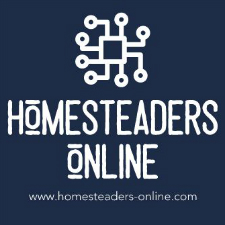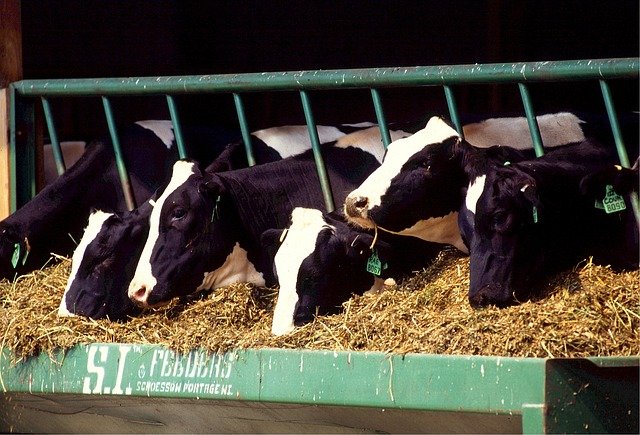Taking Back Control of Our Food Production: The Cattle Conundrum
The way large scale cattle farming is done is very similar to chicken farming in many ways. Dairy cows tend to be smaller than meat cows, so they breed a larger breed for meat. It's a bit baffling to me, because a cow in any form is a big animal with plenty of meat on it!
As with chickens, unless they're using them for breeding, male dairy cows are generally disposed of early on. There is a veal market, but in Britain it became unpopular with many when they realised it was baby cows. Then they ended up disposing of them in other ways, so abstaining from eating veal didn't end up helping matters.
The cattle industry probably trumps as being the worst of the meat industries going as it's not only renowned for animal cruelty it creates a lot of greenhouse gas causing further environmental problems.
Personally, I'm not much of a beef eater, but many people are so there will always be any industry there. The question is, can that industry change to a more humane one? I do think it will be harder to change than the chicken farming industry, but that doesn't mean it's not doable.
Here are some interesting facts. When Europeans first arrived in America there were about 60 million buffalo living wild there, in balance with nature and the ecosystem. Today there are an estimated 90 million domestic cattle. That's certainly an increase, but not as drastic as I originally imagined. Let's be honest, many people consume way more beef than they need to, so reducing the amount of cattle being farmed is not going to leave us with a hungry world. It's also possible that these figures could include the dairy calves that get slaughtered early on. So if they were raised as meat, maybe that could counteract the stocks needed for the meat industry.
There is no reason why male dairy calves can't be raised to adulthood for meat. Okay, there are going to be those who demand things like Angus beef and that will create a market for that breed of cattle. Perhaps there could be a higher price to keep it more of a niche market though. Is there also the possibility that some of the milk industry could come from them, effectively dual purposing both sides of the industry? Of course they wouldn't be as productive as the dairy cows, but that's to be expected.
There are farmers who have found that pasture rotation means that cattle can actually bring fertility back to the land and their cattle then feed how they were designed to feed. Once they are feeding on a grass based diet instead of grain based they are finding that they don't produce nearly as much in the way of greenhouse gases as cattle in feedlots do.
I don't know enough about cattle farming to know if there are any easy solutions so I'd love to hear any thoughts anyone else has on how cattle farming can be done more humanely, with less pollution on a large scale at low cost. I add at low cost, because as terrible as it is to put a low price on the life of an animal, if there is a demand for low cost meat then someone will try and meet it however they can and that's what's led us to this situation.
You can read previous posts in this series here:


I remember reading somewhere that cows have tripled in size since the 1700s!
Good grief! I wonder if they are now as big as buffalo.
I also heard that salt water crocs are much bigger now due to having access to cattle as a food source. I guess even sheep would be much bigger than any native animal.
For an industry that is concerned with economy of scale, it baffles me to no end that they don't use ALL of the animals: raise the boys for meat, use the hides for leather, use the bones for gelatin, etc. Maybe some places do, but I'd wager that's more of a small farmer thing than a massive industrial farming thing, as witnessed by the calves murdered without being "used." I think if you're going to kill the animal, as much use as possible should be gotten, both out of respect for the animal and the environment at large.
I'm surprised by the numbers comparing buffalo in antiquity to modern cattle! Very interesting. Modern scholars are finally coming to realize how the first peoples very wisely worked smarter, not harder, in many ways. Why fence off and take it upon yourself to tend cattle (not that that would be easy with buffalo), when you can just let them tend to themselves and "harvest" via a hunt when needed? Why till up the soil in fenced off rows when you can plant a food forest (the Amazon was planted along rivers this way!) along the river and just send boats down at harvest time to gather and bring it all back to the city via water? Feed your people, much less labor intensive, much less damaging. Modern folk could learn a thing or two...
I guess some must be used because we do have gelatin and leather products, although probably not on the scale we used to as fake is cheaper. I suspect that at least some of the calves that don't go as veal will be used for pet food. There are lots more cuts of meat that don't get used by us that will also likely go as pet food though, so how much of that can be produced? It makes you wonder doesn't it?
I was surprised by the buffalo numbers too! Somebody said that the number was equal to modern cattle as they were trying to demonstrate that they could be farmed free range. It turned out not to be entirely accurate, but not as much as I thought.
Our problem is that we don't like physical labour these days. Everyone wants to be like the aristocracy and pay someone else to do the hard graft then bring the food to them. So we do things the cheapest and quickest way we can to fulfill that want.
I've been thinking a lot about this lately as well! Can I link this and feature your username in the Weekly Homesteading Newsletter this Sunday? Let me know! Thanks!
Sure you can. I'm looking forward to the newsletter! 😊
I'm not the biggest fan (okay I downright hate XD) meat animals and birds, much prefer multi purpose things that have less health issues and take up less space (because your meat and other product is in the one thing) but you know those don't make as much money or something.
I'd be all for large animals and their associated produce being more expensive like larger fish but this idea doesn't seem to be too popular XD
I'm sure what would really be popular is free food cooked and served like a top end restaurant! 🤣 That should stop factory farming, because there would be no profit in it. 😂
I recently read an article on a farmer who does organic olives and free range eggs. He started out with meat birds, but found the processing costs too high. Which is another notch against raising purely for meat.
My family has been buying young steers and feeding them on pasture until slaughter weight for our beef for years now. Partially for some of the reasons you mentioned and also because it produces a healthier meat. Eventually I would like to have a small herd of cattle but that is probably still a few years off.
I can imagine that it has a much better flavour. Yet some people are so used to bland meat they don't even like it to have flavour.
Do you slaughter and butcher yourself or take them somewhere? I gather butchering is a time consuming job on an animal that big.
Happy Sunday! The newest Weekly Homesteading Newsletter has just been published and your article has been featured in the issue! Thank you and have a great day!